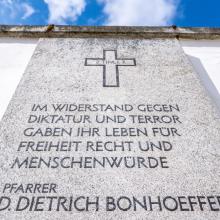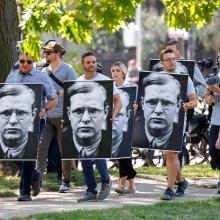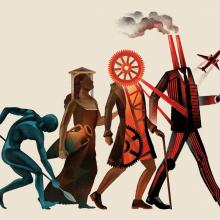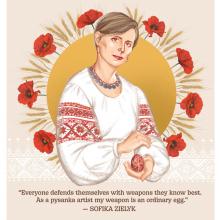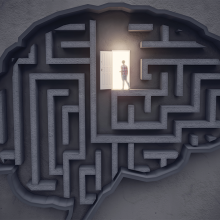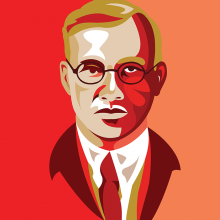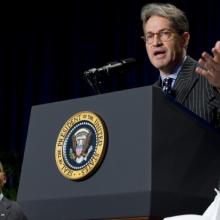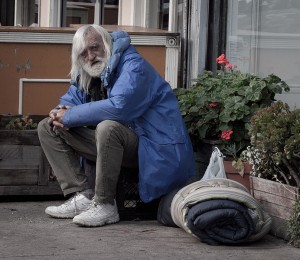dietrich bonhoeffer
New York City Comptroller Brad Lander was arrested by masked Immigration and Customs Enforcement agents on June 17. At a lower Manhattan courtroom, Lander and his staff were attempting to escort a migrant after his court hearing. Seen repeatedly asking ICE agents to produce a judicial warrant, and asserting that they couldn’t arrest an American citizen, Lander was roughly detained and later released, the most recent in a string of Democratic politicians arrested by federal authorities.
A few months before he was arrested, Dietrich Bonhoeffer wrote an essay on Christian responsibility under authoritarianism. Reading it today is both eerily relevant and illuminating.
PHILIP JENKINS’ REMARKABLE Climate, Catastrophe, and Faith: How Changes in Climate Drive Religious Upheaval leads off with Voltaire: “Three things exercise a constant influence over the minds of [humankind] — climate, government, and religion ... That is the only way of explaining the enigma of this world.”
Climate and geology are now the new prisms for our shared discernment of how we are to live in our own time and place as followers of Christ. We’re driven to centering climate because we can no longer live with the expectation of the balanced climate of the last 12,000 years, the geologic epoch called the late Holocene. We are now in a new geologic epoch: the Age of the Human, or the Anthropocene.
Anthropocene reality leaves Christian ethics nowhere to hide. Nowhere to hide because unprecedented cumulative human powers doubled down on planet-spanning changes that launched the first geological epoch created by human choice and action. The fact that human choice and action has done this means that everything, including extinction, turns on ethics. As Christians, we can look away and abdicate our responsibility, but we cannot escape the massive human presence that lines out our lives — and all life. We’ve become totalizing creatures. We humans are, for the first time, both ark and flood.
This extraordinary power has been recognized for a while. In 1944, Dietrich Bonhoeffer wrote that the unprecedented powers of modern science and technology led to a world in which “it all comes down to the human being,” a world where “everything turns upon humanity.” He thus set out to reconceive human responsibility for a world that had come of age. For Bonhoeffer, “world come of age” was not a statement of moral maturity. It was a statement of moral accountability. People who legally come of age at 18 or 21 are accountable, whether they exercise their agency maturely or not. When everything turns on humanity, Bonhoeffer said, the whole human world has arrived at that point of accountability.
A current term for human powers and their collective impact is “assisted evolution.” But the phrase is deceptive because it hides the depth, breadth, and temporal reach of those powers. Does the phrase “assisted evolution” reveal that the carbon people produce has the ability to alter marine chemistry, flood coastlines, strip glaciers “to bare bones,” embolden deserts, warp the circulation of ocean currents, “supercharge extreme weather events,” and rearrange “the distribution of animal, plant, and microbial species across the globe,” as author David Farrier puts it? This isn’t evolution “assisted”; it’s evolution hacked and hijacked.
IN THIS ISSUE, ethicist Larry Rasmussen explains that human economic activity has transformed not only our relationship to the world, but the world itself — we are now in an era where “everything turns upon humanity,” as Dietrich Bonhoeffer put it in a different context. While this new “totalizing” reality of what people are doing to the planet has become virtually undeniable, the human tendency toward unceasing growth, as Jim Rice points out in his column, is still defended by economists, headline writers, and the rest of the “more is more” crowd.
A FEW YEARS ago, I set out to knit a baby blanket as an Advent prayer practice. Knitting is incredibly meditative and allows me to pray with focus and clarity. Knitting a baby blanket seems appropriate as the church awaits the arrival of the “newborn king.” I wish I could say I finished the blanket in time for Christmas. I did not. However, even that seems appropriate, as so much remains unresolved for Jesus’ community at his birth. Their political occupation continued, and even Jesus’ birth story reflects the impositions placed upon his family by the Roman Empire. God’s inbreaking happens under serious duress — but it happens nonetheless.
My favorite lines from the poem “Christmas is Waiting to be Born” by Howard Thurman are: “Where fear companions each day’s life, / And Perfect Love seems long delayed. / CHRISTMAS IS WAITING TO BE BORN: / In you, in me, in all [hu]mankind.”
Thurman reminds us that God was born into our sorrow and among those who are brokenhearted and struggling. That truth is so important to hold on to as we process years of our own collective trauma. No matter how unresolved things are, Christmas is born in us, too! In December we continue our journey through Advent and arrive at Christmas. We might not have received what we’re waiting for by that time, and very little may make sense. Yet, because of who God is, we open our hearts to the improbable, trusting that we won’t be put to shame.
FOR 30 YEARS, I held an uncompromising conviction that abortion was murder. I preached against “child-killing,” suffered multiple arrests for blockading clinics, and had pro-choice groups successfully sue me. I led a national anti-abortion organization and directed the only large-scale annual pro-life event held in the U.S. Capitol. I personally appealed to Supreme Court justices to overturn Roe v. Wade.
Today, I no longer have these positions, and I did not applaud the recent reversal of Roe. I remain an evangelical by belief, but I now call myself a “pro-choice pro-lifer.” I have concluded that legislators and judges are not the people to try to resolve this complex, moral, social, and health-related question. Even among religions, there is no consensus on what constitutes permissible or impermissible abortion. Moreover, each woman’s experience with pregnancy is unique. Therefore, there can be no universal mandate forcing her to continue her pregnancy.
My transformation from an absolute to a nuanced position on abortion proceeded slowly and fitfully. Many exasperated old pro-life movement friends ask, “Whatever happened to you?” The short answer: empathetic listening. There came a moment when I realized I was doing all the talking and no listening on this subject. For nearly three decades, I had lived isolated in a fantasy where I presumed everything would work how it was supposed to, so I questioned nothing. In this fictitious pro-life world, all a woman in an unwelcomed pregnancy needed was to call out for help. In response, pro-life people would instantly help her, offering free housing, parenting supplies, medical care, babysitting, and, should she so choose, adoption. “With so much support,” I asked my audiences rhetorically, “why would anyone choose abortion?” I didn’t want answers.
An Enduring Voice
Theologian of Resistance: The Life and Thought of Dietrich Bonhoeffer, by Christiane Tietz, is an accessible and compact biography of this German theologian, executed by the Nazis, whose writings on Christian community, resistance, and conscience hold continuing power in our times. Fortress Press
Come Together
Deidra Riggs explores God’s call to love in a way that crosses all divisions (even race and political affiliation) in One: United in a Divided World. She reflects on the aftermath of police shootings of black men as well as the fissures in everyday life. BakerBooks
Song and Poetry
The two-volume Celebrating Wendell Berry in Music features essayist, poet, and farmer Berry reading his work, music by Grammy-nominated bluesman Eric Bibb, and choral and art song settings by composer Andrew Maxfield based on Berry’s work. Volume 2, All the Earth Shall Sing, was recently released.
wendellberrymusic.org
We Gon’ Be Alright
Stakes Is High: Race, Faith, and Hope for America is a collection of essays by A.M.E. pastor, Huffington Post contributor, and social commentator Michael W. Waters. He is both blunt and lyrical as he meditates on police violence, racism, hip-hop, and the power of faith. Chalice Press
Are we in a “Bonhoeffer moment” today?
It is common to wonder what we would have done if we lived in history’s most challenging times. Christians often find moral guidance in the laboratory of history—which is to say that we learn from historical figures and communities who came through periods of ethical challenge better than others. Christians who wish to discern faithfulness to Christ often look back to learn how others were able to determine faithful discipleship when their contemporaries could not.
With this in mind, Dietrich Bonhoeffer may help us out today.
Bonhoeffer was a German theologian and pastor who resisted his government when he recognized, very early and very clearly, the dangers of Hitler’s regime. His first warning about the dangers of a leader who makes an idol of himself came in a radio address delivered in February 1933, just two days after Hitler took office.
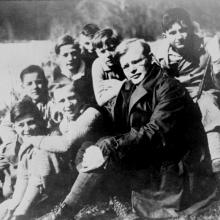
Dietrich Bonhoeffer, Photo via Wikimedia Commons
The German pastor was executed by the Nazi regime at Flossenbürg concentration camp on April 9, 1945, just two weeks before the United States liberated the camp. When he died he famously remarked to another prisoner, "This is the end — but for me, the beginning."
During his 1930-31 fellowship at Union Theological Seminary in New York City, German theologian Dietrich Bonhoeffer joined his African American classmate Albert Fisher as a regular attendee at Abyssinian Baptist Church in Harlem.
WHEN BONHOEFFER entered Harlem with Fisher, he met a counternarrative to the white racist fiction of black subhumanity. The New Negro movement radically redefined the public and private characterization of black people. A seminal moment in African American history had arrived, and all of Bonhoeffer’s descriptions of his involvement in African American life during his Sloane Fellowship year occurred during this critical movement. He turned 25 that February. Bonhoeffer was experiencing that critical moment in African American history while he was still young and impressionable.
The New Negro, a book containing a collection of essays, was edited by one of the leading intellectual architects of the movement, Alain Locke. The New Negro, as Locke and his authors appropriated the term, described the embrace of a contradictory, assertive black self-image in Harlem to deflect the negative, dehumanizing historical depictions of black people. The New Negro made demands, not concessions: “demands for a new social order, demands that blacks fight back against terror and violence, demands that blacks reconsider new notions of beauty, demands that Africa be freed from the bonds of imperialism.” Bonhoeffer knew the movement by the descriptor New Negro, but James Weldon Johnson preferred to describe the movement as the Harlem Renaissance ... as a rebirth of black people rather than something completely new. ...
NO ORDINARY MEN: Dietrich Bonhoeffer and Hans von Dohnanyi, Resisters Against Hitler in Church and State is a tightly woven story framed by the sophisticated historical analysis of its two authors, former senior Farrar, Straus, and Giroux editor Elisabeth Sifton (daughter of theologian Reinhold Niebuhr) and Columbia University professor emeritus Fritz Stern, a famed German scholar. The book profiles two brave young men—Bonhoeffer, a theologian and minister deeply involved in fighting the Nazis’ efforts to control the German Protestant churches, and Dohnanyi, a brilliant lawyer (son of Hungarian composer Ernst Dohnanyi) working in the German Ministry of Justice, who used his key position to methodically collect evidence against the Nazi regime.
Sifton and Stern portray Dohnanyi in detail as a leader in the small but high-powered German resistance movement. Brig. Gen. Hans Oster, a resistance member, hired Dohnanyi away from the Ministry of Justice ostensibly to help run the Abwehr, a German military intelligence organization that was also the center of the anti-Hitler resistance, in 1939. Dietrich Bonhoeffer was then recruited by Dohnanyi to be part of this team. Dohnanyi’s wife, Christine (Bonhoeffer’s sister), is also revealed as a significant influence on and aide to her husband.
The slim, 157-page volume is an important new historical work in the growing field of research on the German resistance movement during World War II. It is a penetrating look at Dohnanyi’s dangerous operations against the Nazis with historical perspective that other books on him and Bonhoeffer lack. Earlier biographies, written mainly by church people, more or less emphasized Bonheoffer as a singular hero fighting Hitler. Bonhoeffer was indeed very brave and traveled thousands of miles abroad while working as an agent for the Abwehr, but he was just one of a circle of resisters.
It’s been several years since I’ve attended a National Prayer Breakfast, the annual event held Thursday morning in Washington, D.C., attended by the President, members of Congress, and guests — about 2,500 of them.
When I lived and worked in D.C. I attended almost every year. Senator Mark Hatfield, for whom I worked, was a faithful member of the Senate Prayer breakfast group which met weekly, and with the group in the House, sponsors the this national event.
My worry always has been that such a gathering merely sprinkles holy water on the nation’s powerful leaders without any real accountability to the prophetic message of the Gospel. As a breakfast speaker one year, Hatfield called for national repentance for arrogance and sin, referring especially to the Vietnam War. His comments broke with the normal rhetorical decorum of the event and angered President Nixon, but received widespread coverage and much respect.
These days, the early-morning prayer breakfast is also accompanied by countless luncheons, dinners, and seminars for people who come from around the nation and the world to attend. The idea behind the prayer breakfast movement is simple: Gather politicians and leaders together in a country (or state, or city) to pray with one another “in the Spirit of Jesus,” and hope that this dependence on God will transcend differences to build a movement grounded in love for one another and one’s neighbor. It’s supposed to be devoid of “politics.”
The Gubbio Project, which helps churches become refuges for homeless people throughout the U.S., recently earned a new fan: Author Anne Rice. "When I was in San Francisco, I visited St. Boniface Church in the Tenderloin and was moved by the sight of many peaceful homeless people sleeping in the pews of the church," Rice wrote on her Facebook.com page earlier this month. The author of the Vampire Lestat books and most recently the biblically-themed Christ the Lord novels and her spiritual memoir, Called Out of Darkness, provided her "people of the page" as she calls them, a link to the Gubbio Project where they could donate to "this fine work on the part of the Franciscans of St. Boniface in helping the homeless."
Glenn Beck can do better. Fox News can do better. When it comes to upholding truth and having civil dialogues, let's be honest, we all can do better.
